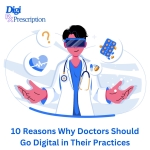
10 Reasons Why Doctors Should Go Digital in Their Practices
The digital transformation of healthcare is no longer a trend—it’s a necessity. Adopting digital tools and systems allows doctors to streamline workflows, enhance patient care, and stay ahead in a competitive healthcare landscape. Here are 10 compelling reasons why doctors should embrace digital solutions in their practices.
1. Enhanced Patient Care
Digital tools ensure better accuracy and efficiency in patient care.
- How It Helps:
- Electronic Health Records (EHRs) provide comprehensive patient histories.
- Advanced diagnostics tools improve treatment accuracy.
2. Improved Workflow Efficiency
Digital solutions automate routine tasks, saving time and reducing administrative burdens.
- How It Helps:
- Appointment scheduling systems minimize manual management.
- Digital prescriptions eliminate handwriting errors and streamline medication management.
3. Increased Patient Engagement
Patients are more likely to stay informed and involved in their healthcare with digital platforms.
- How It Helps:
- Patient portals offer access to medical records and test results.
- Automated reminders for appointments and medications improve adherence.
4. Remote Consultation Capabilities
Telemedicine enables doctors to provide care without geographical limitations.
- How It Helps:
- Video consultations allow access to rural and underserved areas.
- Patients can consult specialists without the need to travel.
5. Cost Efficiency
Digital tools reduce overhead costs and increase profitability.
- How It Helps:
- Automating billing and payment systems minimizes errors and delays.
- Reduces paper usage and associated expenses.
6. Better Compliance and Security
Digital platforms enhance data security and regulatory compliance.
- How It Helps:
- Encrypted systems protect patient information.
- Compliance with health regulations ensures legal safety for doctors.
7. Data-Driven Decision Making
Access to real-time data helps doctors make informed decisions quickly.
- How It Helps:
- Analytics tools track patient trends and outcomes.
- Data insights enable personalized treatment plans.
8. Scalability for Growing Practices
Digital systems can easily adapt to the needs of expanding practices.
- How It Helps:
- Cloud-based platforms allow for seamless integration of new staff and services.
- Multi-location management becomes more efficient.
9. Enhanced Communication and Collaboration
Digital tools improve communication between healthcare providers and patients.
- How It Helps:
- Secure messaging platforms facilitate instant communication.
- Collaborative tools allow multiple providers to coordinate patient care.
10. Staying Competitive in Modern Healthcare
Adopting digital solutions is essential to remain relevant in a tech-driven industry.
- How It Helps:
- Patients prefer healthcare providers who offer convenient digital options.
- Digital branding and online presence attract more patients.
Conclusion
The transition to digital practice is not just about convenience—it’s about delivering superior patient care, improving efficiency, and staying relevant in a rapidly evolving industry. By adopting digital tools, doctors can future-proof their practices and provide better outcomes for their patients.
